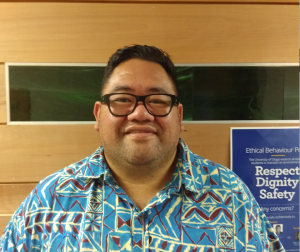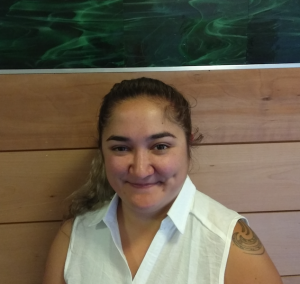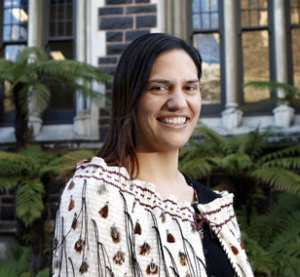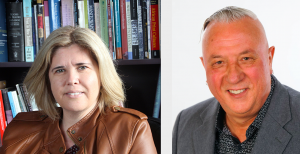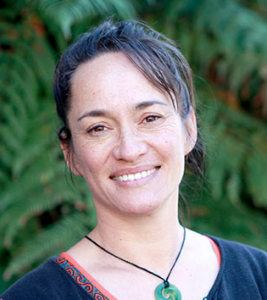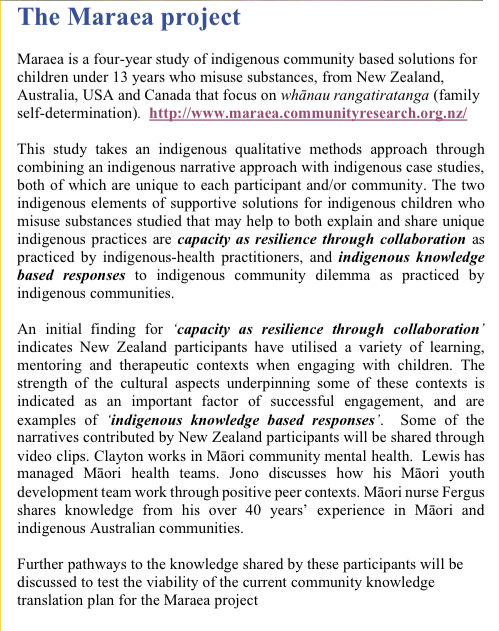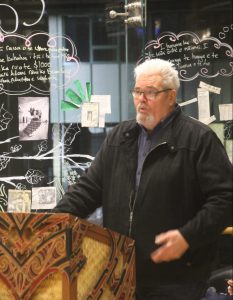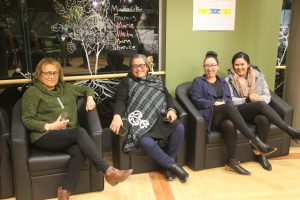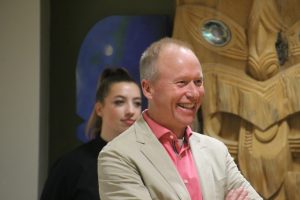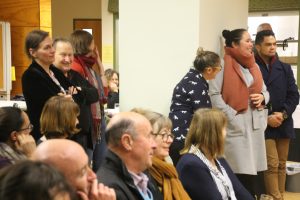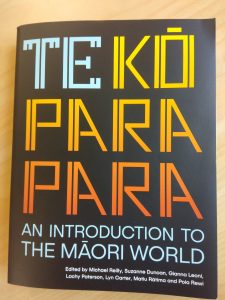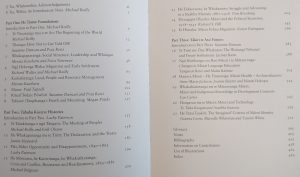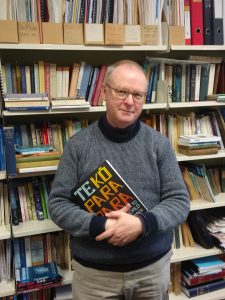New Te Tumu Staff
Te Tumu is fortunate to have two new staff teaching at Te Tumu this year.
Dr Michael Ligaliga was raised in Upolu, Samoa, and attended school in both Samoa and Auckland. He them moved to Hawai’i to pursue undergraduate study at Brigham Young University in Hawai’i, graduating in Political Science and International Peace Building. He first came to Dunedin in 2011, undertaking a PGDipArts at the National Centre for Peace and Conflict Studies, followed by an MA.
Michael then moved back to Hawai’i where he taught at BYU-H, and was for a time the acting Director of the David O. McKay Center for Intercultural Understanding. He then returned to Otago in 2015 to enrol in his PhD at the NCPCS, with Dr Heather Devere as his primary supervisor. Not only is Michael the first Pacific Islands doctoral student to graduate from the Centre, but his thesis was deemed to be ‘exceptional’ (i.e. when all the examiners of a candidate’s thesis agree that the thesis is among the top 10% of theses examined.)
Michael’s research focuses on domestic and family violence through a Peace and Conflict Studies lens, and the application of Peace and Conflict theories to aspects of Pacific societies. In particular he played with Galtung’s Typology of Violence to highlight the “invisible” nature of societal violence. Michael will continue to pursue and publish this research while he is here in Te Tumu.
This year the university is trialing a new co-taught paper at summer school (PACR101) designed to help integrate new Pasifika students into the university lifestyle and community. Michael arrived in January, and was straight into the classroom teaching these students. This year he will be giving some guest lectures in PACI101 “Pacific Societies” and PACI201″Contemporary Pacific Islands Issues”, and in Semester Two he will teaching PACI410 “Pacific Leadership” and PACI310, a special topic based on his doctoral research.
Michael is pleased to be back “home” in Dunedin, as are his wife Faalima and their daughter and son, Joanie and Leahcim.
Dr Gianna Leoni (Ngati Kuri and Ngai Takoto) is well-known to almost anyone associated with Te Tumu. She is a former Tumuaki (President) of Te Roopu Māori (in 2013), and undertook her BA(Hons) at Te Tumu, as well as her MA and PhD. Her PhD, written in te reo Māori, looked at the use of te reo in government departments. She has also been a tutor and senior tutor, research assistant, teaching fellow, and a co-editor of Te Kōparapara, Te Tumu’s MAOR102 textbook.
Her last position was as a postdoctoral fellow, funded by Ngā Pae o te Māramatanga (Whai Rawa theme), investigating the expression of economic aspirations in te reo Māori in the past, present and future.
Gianna has been appointed as a lecturer, and this year will be teaching MAOR311, one of our 300-level Māori language papers, and INGS501, the core theory and methods paper for the Master of Indigenous Studies programme. She will also co-ordinate and teach into MAOR206/306 (He Pūkenga Tuhi), a Māori writing skills paper.
Gianna will continue her research from her postdoctoral programme, but is also interested in issues of Māori identity. She sees a multiplicity of identities, and wishes to break down stereotypes of what “Māori” is meant to mean. She believes it is important for her research to be relevant and contribute to the communities she is involved with, the local Dunedin Māori community and her hau kāinga in Muriwhenua.
In her spare time, Gianna is president of the South Pacific Rugby League and Sports Club. The club, with a mainly Māori and Pasifika membership, now boasts 15 teams playing rugby league, basketball, softball and netball.
New qualification for Te Tumu alumnus
Hone Te Rire is the sort of person who collects qualifications, one of which was our Master of Indigenous Studies, completed in 2009. Hone also trained as an amorangi minister in Te Aka Pūaho (the Presbyterian Māori Synod) and has been working at Nawton Community Presbyterian Church in Hamilton while studying for his Diploma in Ministry through the Knox Centre for Ministry and Leadership.
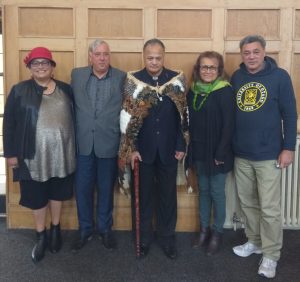
From left: Tangiwai Rewi and Lachy Paterson (Te Tumu), Hone Te Rire, Pearl Matahiki (Tumuaki, Te Huka Mātauraka) and Rev Wayne Te Kaawa (former Moderator of Te Aka Pūaho, and current PhD student and the University’s Māori chaplain).
Several Te Tumu staff members and other University colleagues went along to support Hone at his graduation at John McGlashan College on Wednesday. Hone is considering where his path will lead, and is even contemplating another qualification, a PhD at the University of Otago. Koia ki a koe, e Hone. Kia kaha e hoa.
Te Tumu in this year’s Marsden Round
This has been a great year for research in Te Tumu. Every November Te Pūtea Rangahau a Marsden (Marsden Fund), run by the Royal Society Te Apārangi, announces its forthcoming research grants. Winning a grant is a two stage process, with applicants having to get past a preliminary round, then develop their applications for the second round; they have about a 10% chance of success in the Humanities and Social Sciences panels. There are six successful applications within the Division of Humanities, three of which have a Te Tumu connection.
Dr Karyn Paringatai‘s project “E kore au e ngaro! The enduring legacy of whakapapa” ($823,000, Social Sciences panel) looks at how the knowledge of whakapapa can impact on health, with particular reference to Māori affected by the CDH1 cancer-causing gene. Click here for more information. Professor Parry Guilford, Director of Otago’s Centre for Translational Cancer Research, is an associate investigator on the project.
Associate Professor Lachy Paterson is a principal investigator alongside Associate Professor Angela Wanhalla (History Department) on “Te Hau Kāinga: Histories and Legacies of the Māori Home Front, 1939-1945” ($746,000, Social Sciences panel), exploring the lived experiences of Māori who remained in New Zealand during the Second World War. Click here for more information. Although the project begins next year, one of our undergraduate students, Haeata Watson, has already started a project looking at Ngāti Kahungunu experiences, funded through a Ngā Pae o te Māramatanga Summer Internship.
Both Karyn and Lachy are based in Te Tumu’s Māori Studies programme, occasionally teaching into the Indigenous Development programme. Karyn also coordinates the Master of Indigenous Studies programme.
Professor Merata Kawharu, who until recently held an adjunct position within Te Tumu but is now based at the Centre for Sustainability, was also successful. Her project, “A question of identity: how connected are Māori youth to ancestral marae, and does it matter?” ($605,000, Humanities panel) will investigate the relationships that young Māori have with their marae. Click here to find out more. Merata with be working with associate investigators, Dr Stephen McTaggart (University of Auckland), former Dean of Te Tumu, Professor Paul Tapsell (now at the University of Melbourne) and Dr Krushil Watene (Massey University).
Special thanks to Marjoleine Righarts, Research and Enterprise’s Research Advisor for Humanities who helped immensely with all the applications.
Te Tumu’s Postgraduate Graduands
Te Tumu would like to congratulate its four postgraduate students who will be graduating this December.
Roma-Kiritahi Simmons-Donaldson (Ngāti Porou, Taranaki, Ngāti Tūwharetoa) is graduating with a BA(Hons) in Māori Studies. Her dissertation, “Walking in two worlds – Te reo Māori in urban New Zealand” was supervised by Dr Karyn Paringatai.
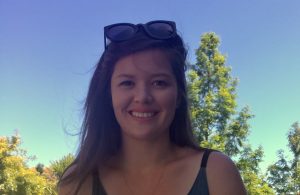 Abstract: The aim of this dissertation is to examine ways in which te reo Māori (the Māori language) can exist in urban New Zealand. Specifically, it will outline a history of te reo Māori, before looking at different ways in which language can be acquired and developed in an urban environment. It will then analyse ways in which te reo Māori has enabled Māori people to negotiate their place in urban New Zealand, in the absence of those environmental stimuli that traditionally inform and enhance a Māori identity and worldview. Central to this dissertation is the concept of intergenerational language transmission. As such, the experiences of my grandmother, mother, and myself will be presented throughout this dissertation to provide context, and to illustrate the interaction between urban migration, language, mechanisms of language acquisition and development, and identity, in a way that contextualises and enriches the literature.
Abstract: The aim of this dissertation is to examine ways in which te reo Māori (the Māori language) can exist in urban New Zealand. Specifically, it will outline a history of te reo Māori, before looking at different ways in which language can be acquired and developed in an urban environment. It will then analyse ways in which te reo Māori has enabled Māori people to negotiate their place in urban New Zealand, in the absence of those environmental stimuli that traditionally inform and enhance a Māori identity and worldview. Central to this dissertation is the concept of intergenerational language transmission. As such, the experiences of my grandmother, mother, and myself will be presented throughout this dissertation to provide context, and to illustrate the interaction between urban migration, language, mechanisms of language acquisition and development, and identity, in a way that contextualises and enriches the literature.
Future plans: “I have just accepted an offer to undertake PhD study at the University of Otago, which will look to fill a gap in the conversation surrounding bilingualism and intergenerational language transmission, and explore in depth the journey of language transmission between second language speaking parents and their first language speaking children. It is my hope that this thesis will help to increase our collective understanding of the intersection of these two stark pathways of language acquisition, and help whānau who are looking to do the same.” Dr Karyn Paringatai and Professor Poia Rewi will supervise Roma’s doctoral thesis.
Pia Cristóbal Kahn undertook the thesis pathway for her Master of Indigenous Studies degree. Her thesis, “Sacred Katuiran: Decolonial Sensibility in the Katipunan Papers / An ‘indigenist hermeneutic’ of 19th century Tagalog revolutionary texts” was supervised by Professor Poia Rewi.
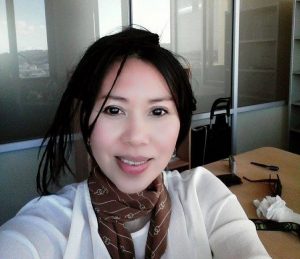 Abstract: Indigenous meanings and renderings tend to be forgotten and buried, and even erased, by non-indigenist interpretations and translations. This is a case study of an ‘indigenist hermeneutic’ approach to a re-translation of the “Kartilya” and other selected texts authored by members of the Katipunan, a 19th century revolutionary movement against Spanish colonial rule in the Philippines. The Tagalog word katuiran, which is often translated to ‘reason’, in support of a prevailing narrative in Philippine historiography that credits the European Enlightenment for primary Katipunan ideas, becomes central to the research as intertextual analyses unearth a variety of its forgotten meanings and usages, and concomitant mistranslations. A comparative conceptual analysis of katuiran and the Māori word tikanga opens up a viable hypothesis for an expanded indigenous meaning of katuiran, that necessitates the re-translation of many passages and other principle ideas of the Katipunan. This re-translation results in a re-narration that depicts an indigenous 19th- century ‘decolonial’ Tagalog movement that sought to delink from European constructs epistemically, ethically and politically; and thus, a re-narration that offers a challenge to a ‘European Enlightenment narrative’ for the Katipunan revolution.
Abstract: Indigenous meanings and renderings tend to be forgotten and buried, and even erased, by non-indigenist interpretations and translations. This is a case study of an ‘indigenist hermeneutic’ approach to a re-translation of the “Kartilya” and other selected texts authored by members of the Katipunan, a 19th century revolutionary movement against Spanish colonial rule in the Philippines. The Tagalog word katuiran, which is often translated to ‘reason’, in support of a prevailing narrative in Philippine historiography that credits the European Enlightenment for primary Katipunan ideas, becomes central to the research as intertextual analyses unearth a variety of its forgotten meanings and usages, and concomitant mistranslations. A comparative conceptual analysis of katuiran and the Māori word tikanga opens up a viable hypothesis for an expanded indigenous meaning of katuiran, that necessitates the re-translation of many passages and other principle ideas of the Katipunan. This re-translation results in a re-narration that depicts an indigenous 19th- century ‘decolonial’ Tagalog movement that sought to delink from European constructs epistemically, ethically and politically; and thus, a re-narration that offers a challenge to a ‘European Enlightenment narrative’ for the Katipunan revolution.
Future plans: “I plan to continue my research on the doctoral level, with a focus on Tagalog cultural conceptualisations, and drawing from the fields of indigenous studies, cultural linguistics, memory studies and oral history.”
Te Tumu also has two staff members who are graduating with their PhDs.
Dr Tangiwai Rewi (Waikato, Ngaati Tiipaa, Ngaati Amaru, Ngaati Tahinga) has completed a doctorate, “Examining traditional Maaori knowledge frameworks and intergenerational knowledge transmission. “Titiro, Whakarongo” – he huarahi ako noo ngaa raa o nehe.” Professor Michael Reilly was the primary supervisor, with Professor Helen May as co-supervisor until her retirement in Dec 2016, and Dr Michelle Schaaf as an Advisor.
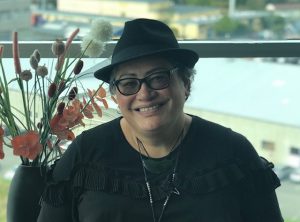 Ariaa: Abstract: This thesis investigates the way knowledge is transmitted inter-generationally, and the teaching and learning methods (or pedagogies) used to do this. The transmission referred to here relates to knowledge about practices associated with the Kiingitanga ‘kingship movement’ of which the Waikato iwi ‘tribe’ have long been the kaitiaki ‘guardians’. The pouwhirinaki ‘participants’ are from the Ngaati Tiipaa and Ngaati Amaru hapuu ‘sub tribes’ from the Port Waikato area; however, participants also came from other hapuu and iwi within the Waikato-Tainui rohe ‘region’.
Ariaa: Abstract: This thesis investigates the way knowledge is transmitted inter-generationally, and the teaching and learning methods (or pedagogies) used to do this. The transmission referred to here relates to knowledge about practices associated with the Kiingitanga ‘kingship movement’ of which the Waikato iwi ‘tribe’ have long been the kaitiaki ‘guardians’. The pouwhirinaki ‘participants’ are from the Ngaati Tiipaa and Ngaati Amaru hapuu ‘sub tribes’ from the Port Waikato area; however, participants also came from other hapuu and iwi within the Waikato-Tainui rohe ‘region’.
I set out to analyse whether there is any correlation between the traditional Maaori knowledge frameworks of old being utilised in the way we learn the roles associated with three domains on the marae ‘communal gathering place’ during three key Kiingitanga events. This thesis explores how learning was undertaken in ngaa whare waananga tawhito ‘traditional houses of learning’ before documenting my participants’ narratives about how they learned their roles. It concludes with my analysis of these findings and offers some recommendations, based on what the participants said, about cultural revitalisation looking forward.
Future Plans: After an enforced leave period from roles and responsibilities in order to complete the thesis, Tangiwai is now relishing the challenge of resuming these expectations. From January 2019 she takes on the 0.5 Academic Dean Maaori position in the Division of Humanities. This is in addition to being the new Co-chair of Poutama Maaori, the Maaori academic staff network across the Otago University campuses which she recently took up in September 2018.
On the research front she is busy implementing one of the translational priorities of her PhD research, Tuupuna Times, which encourages whaanau to record the life stories /narratives of their ruuruhi (elderly women) and koroheke (elderly men). While she has continued to teach her Maaori education papers of MAOR 213, 313 and 413, she also expects to conduct comparative research with two other New Zealand iwi and two other indigenous tribes from Northern America related to her PhD study during her pending Research and Study Leave forecast for the back end of 2020 / start of 2021.
Dr Erica Newman is also graduating, having completed a PhD on Adoption in Fiji. Associate Professors Jenny Bryant-Tokalau and Jacqui Leckie supervised Erica’s thesis, assisted by the Advisory Committee of Professor Michael Reilly and Dr Michaelle Schaaf.
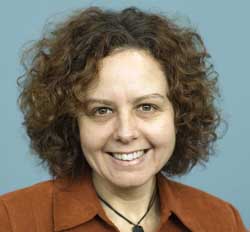 Abstract: The arrival of Europeans in Fiji, from the late 1700s, impacted the established social structures of the indigenous communities, removing what were considered inappropriate social behaviours and introducing concepts and values which altered the societal relationships and status of iTaukei (indigenous Fijians). This included the introduction of colonialist terms and practices of ‘orphan’ and ‘adoption’. Scholars such as Vern Carroll, Ivan Brady and Ward Goodenough have questioned whether the use of these terms were appropriate when referring to the traditional practices of child circulation amongst kin within Oceania. Yet the iTaukei population came to use these terms, practices and their meanings, although not entirely in the same context as the European.
Abstract: The arrival of Europeans in Fiji, from the late 1700s, impacted the established social structures of the indigenous communities, removing what were considered inappropriate social behaviours and introducing concepts and values which altered the societal relationships and status of iTaukei (indigenous Fijians). This included the introduction of colonialist terms and practices of ‘orphan’ and ‘adoption’. Scholars such as Vern Carroll, Ivan Brady and Ward Goodenough have questioned whether the use of these terms were appropriate when referring to the traditional practices of child circulation amongst kin within Oceania. Yet the iTaukei population came to use these terms, practices and their meanings, although not entirely in the same context as the European.
This thesis investigates the colonialist perspective of Fiji’s traditional child circulation and introduced European practices of child care, guardianship, adoption and orphanage institutions. The research covers a number of key topics that are relevant for this thesis. It begins with an understanding of Fijian kinship structure prior to, and just after, the arrival of the first Europeans. The research then explores colonial interventions of guardianship (the first being a consequence of the introduced Indian Indentured Labour Scheme). Missionaries brought with them the institution of orphanages and a history of these are explored (today orphanages are now known as Children’s Homes). The Child Welfare Department in Fiji is responsible for the placement of vulnerable children into safe homes. As they are an important part of guardianship and adoption today this thesis provides a history of how this scheme developed into a government department. In 1945 Fiji enacted the Adoption of Infants Act as a formal process for all children of Fiji, regardless of ethnicity, and this research follows the path of creation. Although the Adoption of Infants Act caters for all ethnicities of Fiji, ‘informal adoption’ or child circulation continued and continues to be practised by iTaukei. During the colonial period the colonial government accepted this customary practice as an acceptable form of child care.
This thesis provides a history of adoption and guardianship practices in Fiji during the colonial period of 1874 to 1970.
Future Plans: Erica will continue to work at Te Tumu, teaching and researching.
Ngā Pae o te Māramatanga Summer Internships
Are you a Māori pre-doctoral student who is interested in advancing your skills and capacity in Indigenous research, and wanting some paid work over summer? Or do you know someone who may be interested? Ngā Pae o te Māramatanga have 27 Summer Internships on offer. Closes 10 October.
**** CLICK HERE TO FIND OUT MORE ****
The Maraea Project: Indigenous Health Solutions
Dr Lisa Chant (Ngāti Whātua, Senior Fellow at Taupua Waiora Centre for Māori Health Research) is our guest presenter at the next Te Tumu Seminar, speaking on the Maraea Project and Indigenous-based health solutions. The seminar will be in Te Iringa Kōrero [3rd floor] of Te Tumu, 3pm on Friday 21 September. Everyone is welcome.
Te Kōparapara Book Launch
Te Tumu enjoyed a great launch last night of its new book, Te Kōparapara: An Introduction to the Māori World. Published by Auckland University Press [click here to order online] , this book will be used by Māori Studies staff in their teaching, particularly for the MAOR102 Māori Society paper.
The event was MC’d by Professor Poia Rewi, the Dean of Te Tumu, then launched by local Ōtākou Rūnaka Representative, Tahu Pōtiki, who reminisced about his own time as a student at Otago, and how there was a gap in local Ngāi Tahu presence in Māori Studies at that time, something that this new book goes some way in filling. Lead editor Professor Michael Reilly spoke on the processes of wrangling such a large number of authors and editors, and of the exemplary work of Ginny Sullivan, AUP’s copy editor who sadly passed away. AUP Director, Sam Elworthy also spoke, singing the praises of the scholarly work being produced by Te Tumu.
In all good bookstores soon!
Ka tangi the kōparapara! Te Tumu staff are delighted with the advance copy of their new book, Te Kōparapara: An Introduction to the Māori World, which arrived a few days ago. This book, published by Auckland University Press, will be out in bookstores next month. Te Tumu will use it as a textbook for our MAOR102: Māori Society paper, replacing Ki Te Whaiao, which staff put out in 2004. But Te Kōparapara will also be of interest to anyone wanting to learn more about te ao Māori.
The kōparapara is the bellbird, the most impressive native songbird, and its tangi is used as a metaphor for the twenty-one chapters in the book. There are three sections. “Te Tumu: Foundations” looks at pre-contact history and Māori culture both from a traditional standpoint, but also in the present. The second section, “Tāhuhu Kōrero: Histories” examines the past from Māori first contacts with Pākehā newcomers to the post-war urban migrations. This leads into “Tākiri the Ata: Futures” which looks at contemporary Māori society and its future. See the contents pages for fuller details. Also click the AUP webpage to access some sample pages.
A number of Te Tumu staff, past and present, have contributed to the book: Michael Reilly, Suzanne Duncan, Poia Rewi, Merata Kawharu, Erica Newman, Paul Tapsell, Megan Pōtiki, Lachy Paterson, Karyn Paringātai, Tangiwai Rewi, Matiu Rātima, Lyn Carter, our postdoc, Gianna Leoni, and former postgrad students Marcelle Wharerau and Tawini White.
We would also like to send out a big mihi to the other authors who also contributed chapters, including from Otago: Richard Walter (Anthropology), Erik Olssen (History, emeritus), Janine Hayward (Politics), Tom Brooking (History), Jacinta Ruru (Law), Anne-Marie Jackson and Hauiti Hakopa (PE), Joanne Baxter (Health); and from further afield, Michael Belgrave (Massey), Richard S. Hill (Victoria), Te Taka Keegan (Waikato) and Acushla Sciascia (AUT). And of course, Sam Elworthy and the team at Auckland University Press.
In particular, we must acknowledge Professor Michael Reilly who led the project, ably assisted by Suzanne Duncan and Gianna Leoni, wrangling all the contributors (and co-editors), communicating with the publisher, and making sure all the little tasks were completed. He mihi nui ki a koe, Michael; mei kore ake koe hei hautū i te kaupapa nei.
Hard Copies Submitted
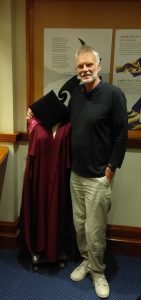 John Birnie submitted the “hard copies” of his PhD thesis today at the Graduate Research School.
John Birnie submitted the “hard copies” of his PhD thesis today at the Graduate Research School.
John has been a fixture at Te Tumu, graduating with his MIndS in 2012. Te reo Māori is one of John’s passions. He was a former high school teacher of te reo, and completed higher level reo classes at Te Tumu. His PhD, “Exploring learner-centredness for adults learning te reo Māori: easing the path to language acquisition” combines his interests in education and Māori-language learning.
John was supervised by Prof. Poia Rewi and Assoc Prof. Lachy Paterson, and by Dr Matiu Rātima in the early stages of his study. Submitting the hard bound copies is the final act in the PhD journey – with the exception of his graduation in May. Koia kei a koe, e Hone!
Te Tumu Graduates in May 2017
Eight Te Tumu students graduated in the May ceremonies last weekend.
Hine Te Ariki Parata-Walker (Ngāti Porou, Ngāi Tahu) completed a Master of Indigenous Studies (MIndS). Her research topic, supervised by Professor Paul Tapsell, investigated procedures around hahunga (the exhumation of ancestral remains) in modern times. Select Parata-Walker abstract for further details.
Karurangi Salu (Tainui, Ngāpuhi, Samoan) gained a BA(Hons) with her research, entitled “Māku anō tōku nei whare e hanga”, looked at how haka and waiata are used in teaching at Te Whare Kura o Rākaumanga to pass on Tainui history, reo, tikanga and whakapapa. Dr Karyn Paringātai supervised. Select Salu abstract for further details.
Rieko Hayakawa also graduated with a PhD in Pacific Islands Studies.
Congratulations also to our BA graduates.
Alice Anderson (Ngāi Tahu), BA in Indigenous Development/Te Kura Matanui.
Luaipouamalo Gafa (Samoan), BA in Pacific Islands Studies.
Maiora Puketapu-Dentice (Te Āti Awa, Tūhoe), BA in Māori Studies and History.
Tataioterangi Reedy (Ngāti Porou, Te Whānau a Apanui), BA in Indigenous Development/Te Kura Matanui.
Roma Simmons-Donaldson (Ngāti Porou, Taranaki, Tainui, Ngāti Tūwharetoa), BA in Māori Studies.

